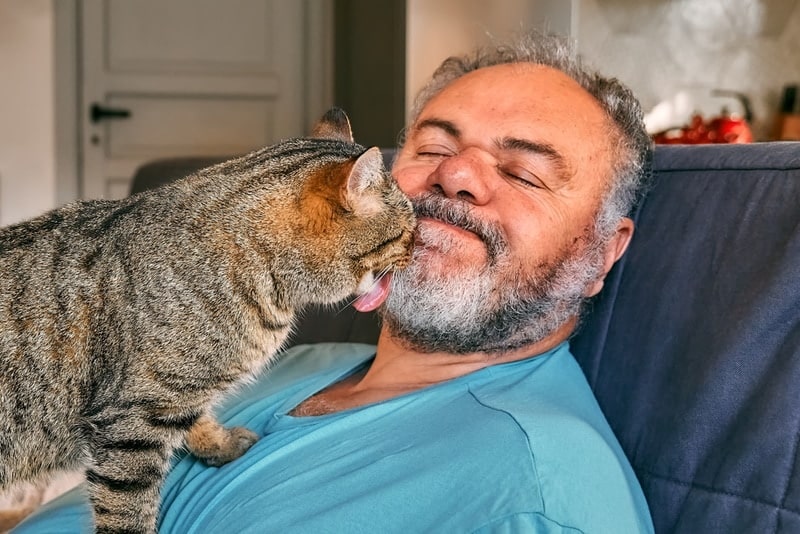Having a cat as a family member can bring you love, adventure, and even confusion. We may never fully understand cats and some of their antics, but it’s clear cat lovers welcome most of them with open arms. When your kitty hops up on your lap and licks your lips there are a few reactions you can have.
You can either be ecstatic that your kitty is showing affection, feel a bit strange that your pet is licking your mouth, or be curious about why your cat is doing this. For cat owners with lip-licking cats, we’re here to help with why some cats do it. Take a look at the likely reasons your cat is licking your lips below to help you better understand your feline friend’s thought process.
The 10 Reasons Why Your Cat Licks Your Lips
1. Showing Their Love for You
One of the leading reasons your cat licks your lips is to show their love for you. Yes, even the most aloof, solitary cat can deem you worthy of a lick or kiss on the lips from time to time. Considering how rare it is for some cats to share licks of affection, you should always appreciate it when your kitty licks you.
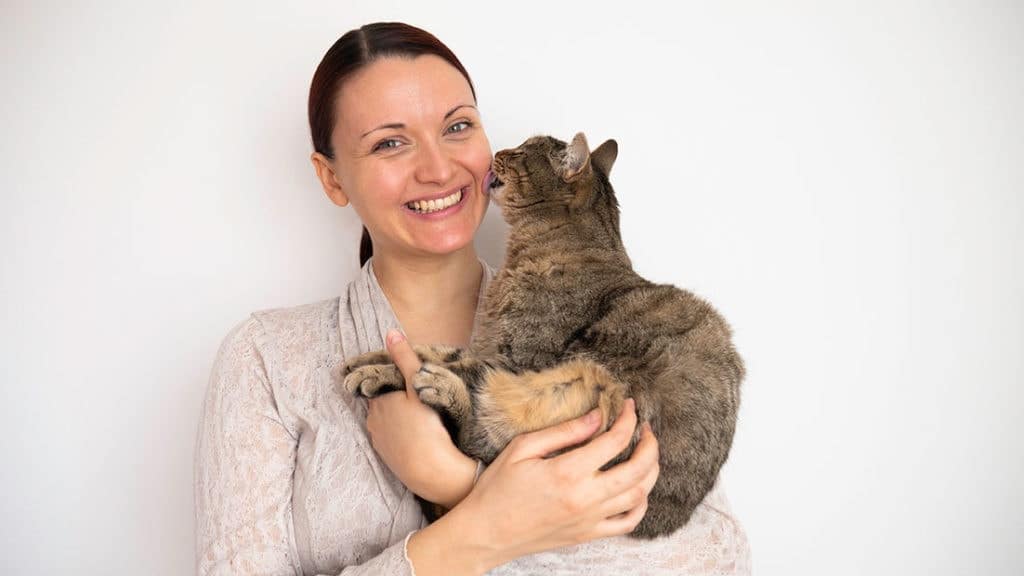
2. Your Kitty Feels Your Mood
Whether you’re feeling blue or under the weather, your cat can sense when you’re unwell. When your cat knows you’re having a bad day, they may lick you on the lips or other areas just to show you they are there and want you to feel better.
3. The Smell of Food
Cats have an incredible sense of smell. No matter how hard you try, even after brushing your teeth, your kitty can smell the remains of food on your breath or lips. Considering cats love food so much, it isn’t surprising that they will lick your lips to grab a morsel you may have left behind.
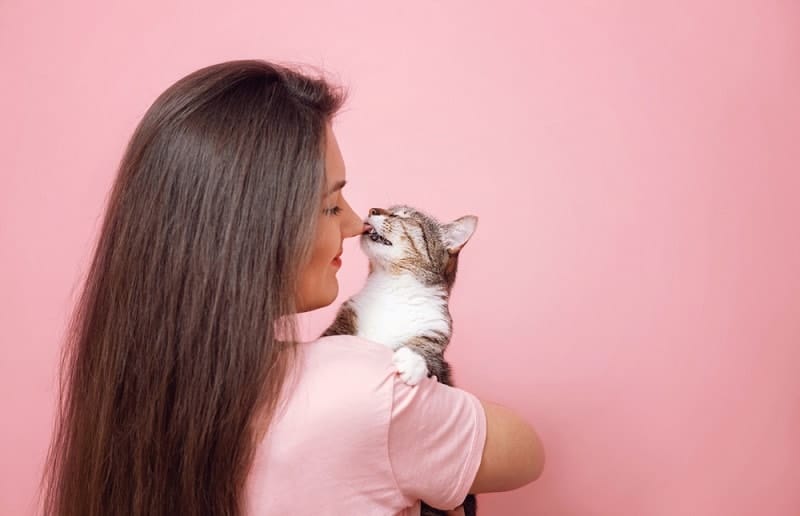
4. Seeking Your Attention
Cats aren’t fond of being ignored. When they want your attention, they will go out of their way to alert you. One way your cat will let you know they want pets, playtime, or food is to lick you. This is a perfect way to get your attention in your cat’s mind. What better place to lick you when attention is needed than on the lips?
5. Marking You
It may sound strange, but yes, cats mark their owners. Your kitty looks at you as their territory. That is why a cat will rub their cheeks against you and lick. A particularly loving cat will focus their attention on your face. Rubbing against your face and then licking your lips is one of the ways cats indicate they own you.

6. Grooming
Don’t take it personally, but your kitty may feel like you need grooming. Luckily, in the world of cats, grooming is a sign of affection. When cats bond, they groom one another. When your cat loves you enough to groom you, especially on your face, they’re showing just how important you are to them.
7. Imitation
Cats love to mimic, and it’s a way they learn new skills. If your cat sees you and your significant other kissing or you sharing a kiss with your children, they may want to copy the gesture. It’s also possible that your cat has seen other animals in the home kiss you. Whether it’s your dog that is constantly licking your face or another cat that is a fan of kissing, don’t be surprised if your kitty mimics what they see.
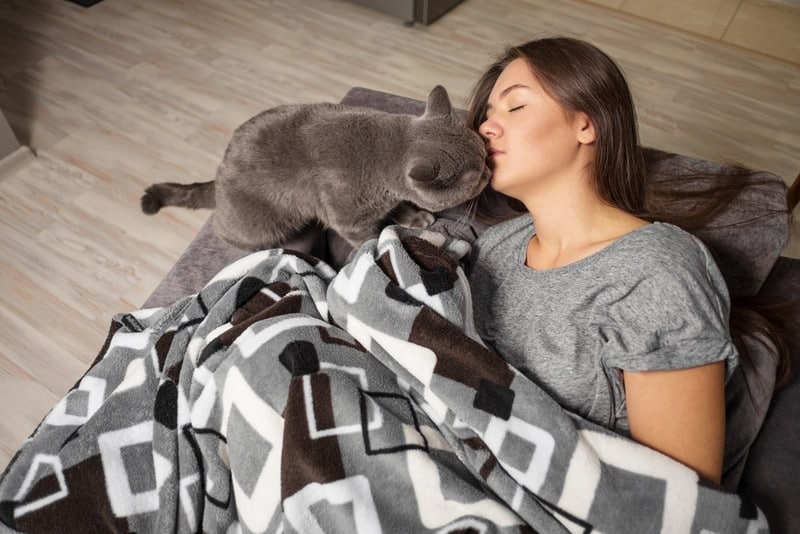
8. Memories
Your cat remembers a lot from when they were a kitten, which is especially true when it comes to pleasure and pain. If you used to frequently pick up your kitten and offer them a kiss, the kitty may want to relive those moments. The only difference is now the cat is in control of when they offer kisses instead of you initiating the contact.
If you weren’t around when your cat was a kitten, the memories of licks on the mouth could be coming from their mothers. Mother cats often lick their kitten’s faces and mouths to clean them after eating or when grooming them.
9. Teaching You
When a cat bonds with their owner it isn’t unusual for the kitty to see you as family, or another cat. In the cat world, this means you need to be taught a few things.
A lick to the lips could be your cat’s way of teaching you to groom considering their mother did it for them as a kitten. Your cat could also be trying to teach you how to mask your scent from predators. No matter what they are teaching, you are now family.
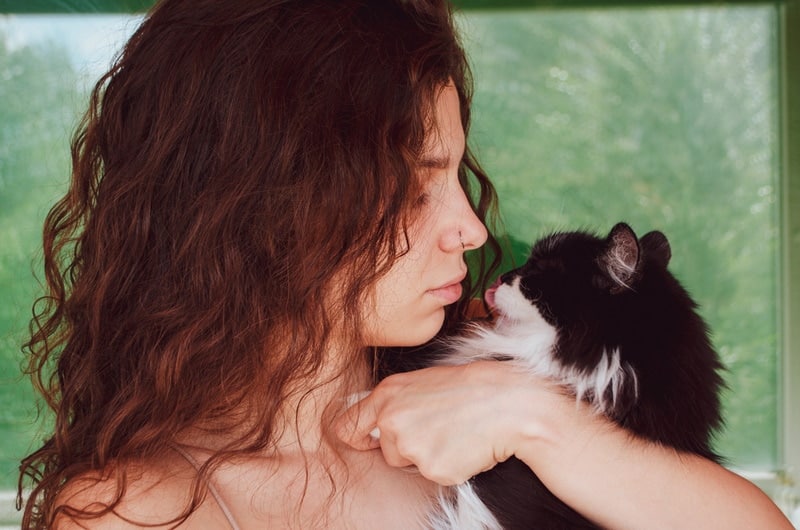
10. An Upcoming Love Bite
Have you heard of a love bite? Yes, cats are well known for them. It is when a cat licks and then immediately bites you. While it can be painful, it is another sign of affection. If your cat is licking your lips, it could be time for you to prepare for a nip, as a love bite could be coming.

Conclusion
As you can see, there are several reasons why your cat licks your lips. Whether your cat feels like you are unable to care for yourself, sees you as family, or wants a taste of whatever you’ve eaten recently, it’s hard to push your kitty away when they want to lick you.
Of course, if you aren’t comfortable with your cat licking your lips, diverting their attention usually stops the behavior. Also, it’s best to wash your face thoroughly after a feline kiss. If you don’t mind it, you can appreciate the love and affection your cat is offering. The relationship between the two of you will only grow.
See also:
- Why Do Cats Lick Each Other? 3 Reasons for This Behavior
- Do Cats Like Kisses? Feline Preferences Revealed
Featured Image Credit: Caterina Trimarchi, Shutterstock

